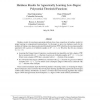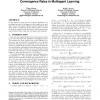906 search results - page 110 / 182 » Games for Learning and Learning from Games |
COLT
2008
Springer
13 years 10 months ago
2008
Springer
We analyze a sequential game between a Gambler and a Casino. The Gambler allocates bets from a limited budget over a fixed menu of gambling events that are offered at equal time i...
CORR
2010
Springer
13 years 9 months ago
2010
Springer
Hardness results for maximum agreement problems have close connections to hardness results for proper learning in computational learning theory. In this paper we prove two hardnes...
ATAL
2008
Springer
13 years 11 months ago
2008
Springer
In this paper we study the use of experts algorithms in a multiagent setting. In this paper we allow agents to use multiple experts and explore different experts algorithms that a...
AAAI
2006
13 years 10 months ago
2006
We use game theory to analyze meta-learning algorithms. The objective of meta-learning is to determine which algorithm to apply on a given task. This is an instance of a more gene...
AI
2007
Springer
13 years 9 months ago
2007
Springer
The area of learning in multi-agent systems is today one of the most fertile grounds for interaction between game theory and artificial intelligence. We focus on the foundational...


